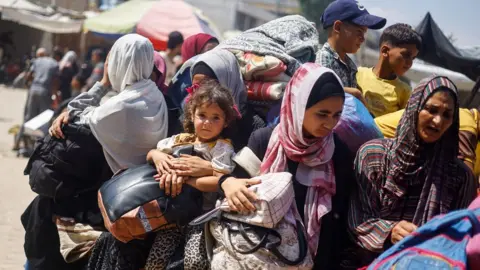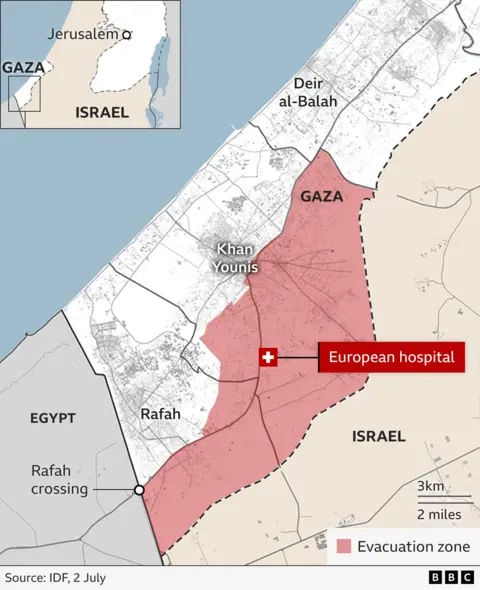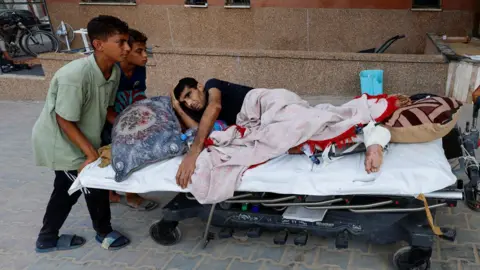Palestinians flee Khan Younis as Israeli forces strike south Gaza
 Reuters
ReutersThe UN says 250,000 Palestinians in southern Gaza have been affected by evacuation orders from the Israeli military.
Many people have been fleeing areas in and around the second city of Khan Younis on foot and by car.
The Red Cross said a major hospital in the area was unable to continue functioning because so many medical staff had left along with patients, although the military said they were not subject to an evacuation order.
Gazan health officials say eight Palestinians were killed and dozens wounded during overnight Israeli strikes.
Louise Wateridge, an official with the UN agency for Palestinian refugees (Unrwa) in Gaza, asked where people could go as they were forced to leave their homes once again.
“In this area, people were already forced to survive in severely damaged, destroyed, structurally unsafe buildings after the Rafah military operation,” she said.

Once again on the move - huddled on carts, motorbikes and pickup trucks - thousands of Palestinians have been fleeing towns and villages to the east of Khan Younis.
After issuing evacuation orders on Monday evening, the Israeli military mounted strikes overnight on the area from which it says around 20 projectiles were fired into Israel on Monday morning - the biggest such barrage for months.
The military said it hit targets including a weapons storage facility and operational centres of Palestinian armed groups.
The Palestinian Red Crescent Society said that eight people were killed and more than 30 wounded.
The armed wing of Palestinian Islamic Jihad said it carried out the rocket attack on Monday, but the military again accused Hamas of continuing to “systematically violate international law while using civilian infrastructure and the civilian population as human shields”.
Among those fleeing a possible Israeli ground assault were patients and medical staff at the city's European Gaza hospital, which is now all but deserted. The military said it did not issue an evacuation order for the hospital.
The head of the emergency department at the hospital, Dr Abdullah Hamdan, said it was the Hamas-run Gaza health ministry that said they should evacuate patients and equipment.
He said that there were around 230 patients in various departments. Many were taken to another facility in western Khan Younis, Nasser hospital, he added.
One patient being treated for cancer told the BBC that he was transferred by ambulance to Nasser hospital, but that he had not been able to get in and was now on the street.
Later on Tuesday, the International Committee of the Red Cross said so many staff members had evacuated the European hospital that it was unable to continue functioning effectively.
The ICRC said it was moving its team and patients to a field hospital near Rafah and that the staff would return to the European hospital once conditions allowed.
“As evacuations continue to affect so many people, it is critical that safe transport for those who are disabled, the elderly, and the sick is provided," it added.
 Reuters
ReutersMuch of Khan Younis was destroyed in a sustained Israeli offensive against Hamas earlier this year.
The city to which some of its residents subsequently returned was almost unrecognizable. Nevertheless, thousands of people moved back to take refuge from Israel's offensive in Rafah.
Many have been displaced five or six times during the war.
One man told the BBC: “We no longer know where we should go next? We have no other choice now but to die in our homes because there is no place left that we have not been displaced to.”
A young boy echoed this: “We were sitting in safety and suddenly we heard the army order to evacuate the area... I want to know where we should go next? I burst into tears when I heard the news of the evacuation.”
The Israeli military has told residents to move to the west of Khan Younis to the overcrowded area of al-Mawasi - which Israel designated as a “humanitarian area” from early on in the conflict.
In recent days, Israeli leaders have said the intense phase of the war to eradicate Hamas is coming to an end, but that may be premature as Palestinian fighters continue to re-emerge in areas the army had previously cleared.
On Tuesday afternoon, Prime Minister Benjamin Netanyahu dismissed a New York Times report, citing unnamed current and former security officials, that said Israel’s top generals “want to begin a ceasefire in Gaza even if it keeps Hamas in power for the time being”.
"I do not know who these anonymous sources are, but I am here to make it unequivocally clear: this will not happen. The war will end once Israel achieves all of its objectives, including the destruction of Hamas and the release of all of our hostages,” Mr Netanyahu said.
On Monday, US Secretary of State Antony Blinken said Hamas was the “one exception” to international support for a ceasefire proposal outlined by President Biden at the end of May.
“We’ve been in an intense effort with the Egyptians, with the Qataris to see if we could close the gaps that Hamas created in not saying yes to a proposal that everyone, including the Israelis, had said yes to,” he said at the Brookings Institution think tank in Washington DC.
